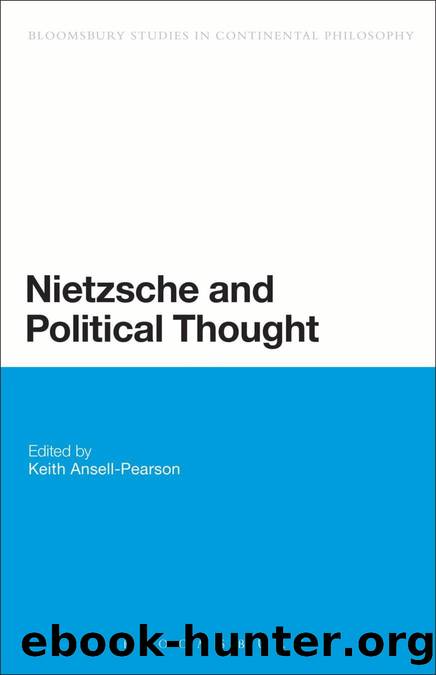Nietzsche and Political Thought by Keith Ansell Pearson;

Author:Keith Ansell Pearson; [Pearson;, Keith Ansell]
Language: eng
Format: epub
ISBN: 9781441173522
Publisher: Bloomsbury
Published: 2019-11-23T06:00:00+00:00
Notes
1 Invented in 1866, the firing rate of the Reffye mitrailleuse was 100 rounds per minute, with an effective reach of about 2,000 yards.
2 But note how this section ends: âThen the concept of politics will have been completely taken up into a spiritual war, all the power arrangements of the old society will be detonated â all of them rest on the lie: there will be such wars as there have not yet been on earth. Only after me will the earth have grand politicsâ. While Nietzscheâs critics are quick to link âthere will be such wars as there have not yet been on earthâ with World Wars I and II, they neglect to note that Nietzsche is talking here about a new concept of politics that will engage in a âspiritual warâ, a Geisterkrieg. Here and in what follows, I use the translations of HH, MM, and WS by Gary Handwerk, BGE and GM by Adrian Del Caro, and TI, AC, and EH by Carol Diethe that will appear in The Complete Works of Friedrich Nietzsche (Stanford: Stanford University Press, forthcoming). Translations from the KSA and KGB are my own.
3 A recent case in point is Derek Parfitâs treatment of Nietzsche in the second volume of On What Matters. While Parfit can be, at times, very sensitive to the nuances of Nietzscheâs prose, he has no problem taking Nietzscheâs militarism and âmurderous phantasiesâ (579) at face value, equating them with the thoughts of Himmler and Hitler (cf. esp. 575â80).
4 Several of the following paragraphs are drawn from an earlier discussion focused on Deleuze in Schrift 2006.
5 Kant 1960, p. 32.
6 See Lacan 1992. Lacan shares the view that ethics and morality are possible only within a Kantian framework, as he notes, following his mention of the categorical imperative, that âIn truth, I believe that the achievement of a form of subjectivity that deserves the name of contemporary, that belongs to a man of our time, who is lucky enough to be born now, cannot ignore [The Critique of Practical Reason]â (77).
7 Copjec 1996, p. xiv.
8 Deleuze regards Lacanâs Ãcole Freudienne de Paris as a âstatutory organizationâ in ways that recall Nietzscheâs account of the establishment of the Church in Deleuze 1987, p. 85.
9 Roosevelt 1941.
10 Bush 12 September 2001.
11 Bush 11 October 2001.
12 For an interesting treatment of Rawls that highlights his Manichean leanings in Laws of Peoples, see McBride 2008.
13 Deleuze and Guattari 1994, p. 48.
14 I have explored this point elsewhere; see Schrift 2009.
15 Deleuze 1988, p. 23.
16 Unless otherwise noted, I have used Edwin Curleyâs translation of Spinozaâs Ethics and cite it parenthetically using the following standard abbreviations: Roman numeral = Part; D = Definition; P = Proposition; c = corollary; d = demonstration; s = scholium. Thus IIIP35s = Ethics Part III, Proposition 35, scholium.
17 Deleuze 1983, p. 2.
18 Ibid.
19 I follow Michael Della Rocca in preferring to translate this Proposition more literally than does Curley; see Della Rocca 1996, p. 257, n. 4.
20 Della Rocca, p.
Download
This site does not store any files on its server. We only index and link to content provided by other sites. Please contact the content providers to delete copyright contents if any and email us, we'll remove relevant links or contents immediately.
The remains of the day by Kazuo Ishiguro(8965)
Tools of Titans by Timothy Ferriss(8360)
Giovanni's Room by James Baldwin(7316)
The Black Swan by Nassim Nicholas Taleb(7101)
Inner Engineering: A Yogi's Guide to Joy by Sadhguru(6785)
The Way of Zen by Alan W. Watts(6592)
Asking the Right Questions: A Guide to Critical Thinking by M. Neil Browne & Stuart M. Keeley(5751)
The Power of Now: A Guide to Spiritual Enlightenment by Eckhart Tolle(5743)
The Six Wives Of Henry VIII (WOMEN IN HISTORY) by Fraser Antonia(5493)
Astrophysics for People in a Hurry by Neil DeGrasse Tyson(5172)
Housekeeping by Marilynne Robinson(4434)
12 Rules for Life by Jordan B. Peterson(4298)
Double Down (Diary of a Wimpy Kid Book 11) by Jeff Kinney(4257)
The Ethical Slut by Janet W. Hardy(4240)
Ikigai by Héctor García & Francesc Miralles(4235)
Skin in the Game by Nassim Nicholas Taleb(4232)
The Art of Happiness by The Dalai Lama(4120)
Skin in the Game: Hidden Asymmetries in Daily Life by Nassim Nicholas Taleb(3986)
Walking by Henry David Thoreau(3950)
